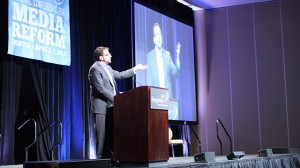From the digital divide to media consolidation to net neutrality, Craig Aaron, president and CEO of Free Press, is on the front lines of media reform. In a discussion with Moyers & Company’s Michael Winship, Aaron says he’s hopeful for the future of the movement. “I think our opponents have very deep pockets. I think they haven’t begun to try all of their dirty tricks. But ultimately, I believe that organized people can still beat organized money, and that’s what we’re trying to do,” he says. The conversation* was recorded at the National Conference on Media Reform in Denver, organized by Free Press.
* Winship lost his voice in Denver, so he apologizes in advance for his froggy interview technique!
highlights
Advice for Obama on choosing a new FCC chair
“I would ask him to put somebody in this job who is going to be that public servant, someone who’s independent of the companies, who isn’t looking for their next job, who actually sees the responsibilities of the job, who’s an effective communicator, and who’s willing to do the heavy lifting and the hard work that’s necessary. Congress is not going to do it, not the way it’s currently constructed. So the FCC is going to have to carry some water here, and that means someone with strong political will.”On his deep-pocketed opponents’ power
“People forget that the media lobby, the Internet lobby, the phone lobby — it’s one of the biggest lobbies in Washington. They spend more money trying to influence the government than anybody except probably the drug industry — more than oil and gas. These are major, major players. They don’t get the attention of those sort of more controversial industries, but they certainly spend that kind of money. For every person like me, who’s a public interest lobbyist, there are 500 lobbyists on the other side. Every member of Congress has their personal media and telecommunications lobbyist.”
“I come to the work because I was a journalist. I worked as an independent journalist, saw the struggles of getting different kinds of stories out there. Just the general struggles facing journalism got me very interested in media policy and media structures, brought me to the work and then has expanded my interest to talk about Internet issues and all of the things that are shaping the future of the media. I was maybe destined for it. My dad is a local television reporter and has been for going on 40-some years, and my mother actually worked in the cell phone business in the early days, so it was perhaps destiny.”
On public media
“[W]e were really believe at Free Press that the definition of public media needs to be expanded, that it is PBS and NPR and those are incredibly important, but it’s also community radio, it’s public access television, it’s LPFM, low-power FM radio, it’s nonprofit websites, and that looking at the fuller picture, the full community, that there be lots of advantages in collaboration, lots of reasons to increase support. We happen to believe that the answer to the crisis in journalism that we’ve been experiencing is public media, is funding in a bigger way. We spend a tiny fraction of the federal budget on supporting public media. It works out to about $1.50 per capita — $400 million dollars a year total.”


